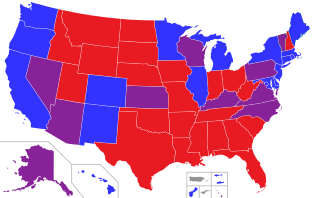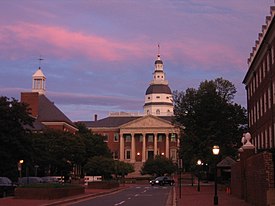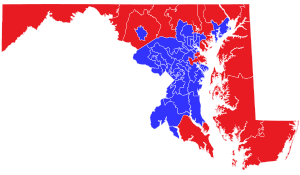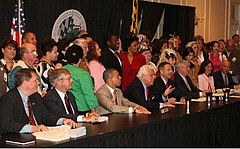
In the United States, the state legislature is the legislative branch in each of the 50 U.S. states.

The California State Legislature is a bicameral state legislature consisting of a lower house, the California State Assembly, with 80 members; and an upper house, the California State Senate, with 40 members. Both houses of the Legislature convene at the California State Capitol in Sacramento. The California state legislature is one of just ten full-time state legislatures in the United States. The houses are distinguished by the colors of the carpet and trim of each house. The Senate is distinguished by the color red and the Assembly by the color green, inspired by the United Kingdom's House of Lords and House of Commons respectively.

The Massachusetts General Court, formally the General Court of Massachusetts, is the state legislature of the Commonwealth of Massachusetts located in the state capital of Boston. The name "General Court" is a holdover from the earliest days of the Massachusetts Bay Colony, when the colonial assembly, in addition to making laws, sat as a judicial court of appeals. Before the adoption of the state constitution in 1780, it was called the Great and General Court, but the official title was shortened by John Adams, author of the state constitution. It is a bicameral body. The upper house is the Massachusetts Senate which is composed of 40 members. The lower body, the Massachusetts House of Representatives, has 160 members; until 1978, the state house had 240 members. It meets in the Massachusetts State House on Beacon Hill in Boston.

The Georgia General Assembly is the state legislature of the U.S. state of Georgia. It is bicameral, consisting of the Senate and the House of Representatives.

The North Carolina General Assembly is the bicameral legislature of the state government of North Carolina. The legislature consists of two chambers: the Senate and the House of Representatives. The General Assembly meets in the North Carolina State Legislative Building in Raleigh.

The Tennessee General Assembly (TNGA) is the state legislature of the U.S. state of Tennessee. It is a part-time bicameral legislature consisting of a Senate and a House of Representatives. The Speaker of the Senate carries the additional title and office of Lieutenant Governor of Tennessee. In addition to passing a budget for state government plus other legislation, the General Assembly appoints three state officers specified by the state constitution. It is also the initiating body in any process to amend the state's constitution.

The Maryland Senate, sometimes referred to as the Maryland State Senate, is the upper house of the General Assembly, the state legislature of the U.S. state of Maryland. Composed of 47 senators elected from an equal number of constituent single-member districts, the Senate is responsible, along with the Maryland House of Delegates, for passage of laws in Maryland, and for confirming executive appointments made by the Governor of Maryland.

The Mississippi Legislature is the state legislature of the U.S. state of Mississippi. The bicameral Legislature is composed of the lower Mississippi House of Representatives, with 122 members, and the upper Mississippi State Senate, with 52 members. Both representatives and senators serve four-year terms without term limits. The Legislature convenes at the Mississippi State Capitol in Jackson.

Susan Clair Lee is an American politician. She has served as the 72nd Maryland Secretary of State since 2023. She was a member of the Maryland State Senate from 2015 to 2023, and of the Maryland House of Delegates from 2002 to 2015. She represented District 16, covering parts of Montgomery County, and was the first Asian American elected to the Maryland State Senate, as well as the first Asian American woman and first Chinese American elected to the Maryland legislature.

The Alabama Legislature is the legislative branch of the government of the U.S. state of Alabama. It is a bicameral body composed of the House of Representatives and Senate. It is one of the few state legislatures in which members of both chambers serve four-year terms and in which all are elected in the same cycle. The most recent election was on November 8, 2022. The new legislature assumes office immediately following the certification of the election results by the Alabama Secretary of State which occurs within a few days following the election.

The Legislature of the State of Oklahoma is the state legislative branch of the U.S. state of Oklahoma. The Oklahoma House of Representatives and Oklahoma Senate are the two houses that make up the bicameral state legislature. There are 101 state representatives, each serving a two-year term, and 48 state senators, who serve four-year terms that are staggered so only half of the Oklahoma Senate districts are eligible in each election cycle. Legislators are elected directly by the people from single member districts of equal population. The Oklahoma Legislature meets annually in the Oklahoma State Capitol in Oklahoma City.

Adrienne Alease Jones is an American politician who has served as the 107th Speaker of the Maryland House of Delegates since 2019. A member of the Democratic Party, she is the first African-American and first woman to serve in that position in Maryland. She has represented District 10 in the Maryland House of Delegates since 1997.

Pamela Graboski Beidle is an American politician who has served as a member of the Maryland Senate from District 32 since 2019. A member of the Democratic Party, she previously represented the district in the Maryland House of Delegates from 2007 to 2019, and was a member of the Anne Arundel County Council from 1998 to 2006.

Robert Alan Zirkin is an American politician who was a member of the Maryland Senate from the 11th district from 2007 to 2020. A member of the Democratic Party, he previously represented the district in the Maryland House of Delegates from 1999 to 2007.

The Annotated Code of Maryland, published by The Michie Company, is the official codification of the statutory laws of Maryland. It is organized into 36 named articles. The previous code, organized into numbered articles, has been repealed.

Mary Beth Carozza is an American politician who is a Republican member of the Maryland State Senate, representing District 38. She previous represented District 38C in the Maryland House of Delegates from 2015 to 2019.

Jason Cord Buckel is an American politician, and the minority leader in the Maryland House of Delegates. He has represented District 1B since 2015. He is a member of the Republican Party.

Christopher R. West is an American politician from Maryland from the Republican party. He is a member of the Maryland Senate from the 42nd district, representing Central and Northern Baltimore County. He was previously a member of the Maryland House of Delegates from District 42B.

Clarence K. Lam is an American politician and physician who has served in the Maryland Senate representing the 12th district since 2019. A member of the Democratic Party, his district stretches across Anne Arundel and Howard counties and includes parts of Columbia and Glen Burnie. Lam previously represented the district in the Maryland House of Delegates from 2015 to 2019.

Mike Griffith is a Republican member of the Maryland House of Delegates representing District 35B since January 7, 2020. Griffith was appointed by Maryland governor Larry Hogan after Andrew Cassilly resigned the seat to become a senior advisor to Hogan.



























